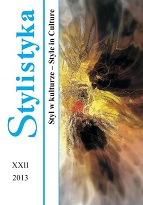UNIVERBIZOVANÉ NÁZVY INSTITUCÍ - STYLOVÁ HODNOTA, EXPRESIVITA A VHODNOST JEJICH UŽITÍ Z HLEDISKA JAZYKOVÉ KULTURY
Univerbizates in the names of institutions – the stylistic value,expressiveness and their proper or unsuitable usage
Author(s): Ivana KolářováSubject(s): Language and Literature Studies
Published by: Uniwersytet Opolski
Keywords: univerbizates; multi-word lexeme; stylistic value; adequacy using; cultured speech
Summary/Abstract: The names of institutions in the Czech language are: – multi-word lexeme/collocation: prùmyslová škola, úøad práce; – one-word lexeme – primary derivates: ohlašovna, knihovna; – “univerbizates“ – words formed by fusion of multi-word lexeme: prùmyslová škola, úøad práce (multi-word lexemes) – prùmyslovka, pracák (univerbizates). Names of institutions that are formed as univerbizates, are almost stylistically marked. They are stylistically differentiated: some of them are standard (devítiletka, jednotøídka), others are slightly substandard – colloquial (prùmyslovka, akciovka) or more substandard – slangy: uèòák, beròák, dìcák. The process of derivation of univerbizates is not so varied as derivation of the primary derivates. Most univerbizates – names of institutions are formed by several suffixes: -ka, -ák, rarely by suffixes -áè, -da, -árna. There are only substantive univerbizates and probably no adjectival, verbal or adverbial univerbizates. The word-forming of univerbizates is quite conservative compared to the word-forming of other words in Czech.
Journal: Stylistyka
- Issue Year: 2013
- Issue No: XXII
- Page Range: 213-232
- Page Count: 19
- Language: Czech

